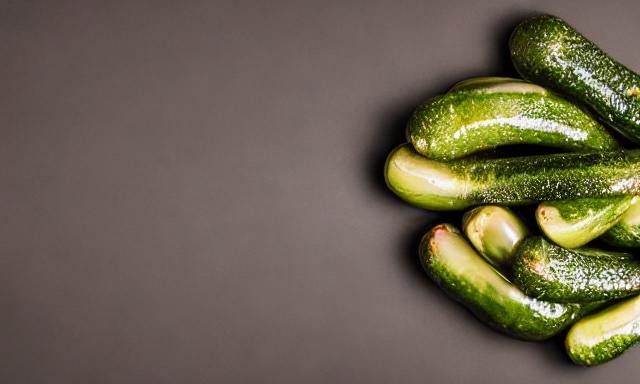Internet Asks: “Are Pickles Acidic?”
Pickles are a beloved snack that can be enjoyed on their own or added to sandwiches and salads. They come in different varieties, from sweet to spicy, and are made by fermenting cucumbers in vinegar, brine, or a combination of both. But have you ever wondered if pickles are acidic?
In this article, we'll explore the acidity of pickles, how it affects their taste and texture, and the potential health benefits and drawbacks of consuming acidic foods.
sponsored links

What are Pickles and How are They Made?
Pickles are cucumbers that have been soaked in a solution of vinegar, salt, and other spices to give them their distinctive flavor. The process of pickling cucumbers has been used for centuries to preserve the vegetables and add flavor. The acidity of the vinegar and salt helps to prevent the growth of harmful bacteria, which can spoil the cucumbers.
Are Pickles Acidic?
The pH of pickles can vary depending on the type of pickle and the method of preparation. However, on average, pickles have a pH level of around 3.2 to 3.6, which is considered moderately acidic. The acidity of pickles comes from the vinegar used in the pickling solution. Vinegar is an acidic liquid that typically has a pH level between 2.4 and 3.4, depending on the type of vinegar used. The acidity of pickles can also vary depending on the length of fermentation, with longer fermentation times resulting in more acidic pickles.
How Does Acidity Affect the Taste and Texture of Pickles?
The acidity of pickles gives them their distinctive tangy flavor. The higher the acidity, the more pronounced the tangy flavor will be. However, high acidity can also affect the texture of pickles. The longer cucumbers are pickled, the more the acidity of the vinegar will break down the cell walls of the cucumbers, making them softer and less crisp. This is why some people prefer their pickles with a shorter pickling time, as they will be crisper and have a milder flavor.
sponsored links
Potential Health Benefits of Consuming Acidic Foods
- Source of Probiotics: Pickles that are made through fermentation, also known as lacto-fermentation, contain beneficial bacteria known as probiotics. Probiotics are good for gut health, and they can improve digestion and boost the immune system.
- Hydration: Pickles are made up of mostly water, which makes them a great snack for staying hydrated.
- Low-Calorie Snack: Pickles are low in calories and can be a healthy snack option, especially for those trying to lose weight.
- Lowers blood sugar levels: Some studies have shown that consuming vinegar, a common ingredient in pickles, may help regulate blood sugar levels.
- Rich in antioxidants: Pickles contain antioxidants, which can help protect cells from damage caused by harmful molecules known as free radicals.
- May help reduce muscle cramps: Pickles contain electrolytes like sodium and potassium, which can help prevent muscle cramps and improve athletic performance.
- Boosts immunity: Pickles contain vitamin C, which is essential for a healthy immune system.
- May improve mood: Pickles contain vitamin B6, which is important for the production of neurotransmitters like serotonin and dopamine, which can improve mood.
Potential Drawbacks of Consuming Acidic Foods
- Tooth decay: Consuming highly acidic foods like pickles can erode tooth enamel, leading to tooth decay.
- Digestive problems: Some people may experience digestive problems like acid reflux or heartburn when consuming highly acidic foods like pickles.
Incorporating Pickles into Your Diet
Pickles can be a tasty and healthy addition to your diet when consumed in moderation. Here are some tips for incorporating pickles into your diet:
- Choose lower-sodium varieties: Some pickles can be high in sodium, which can be problematic for people with high blood pressure. Look for lower-sodium varieties or make your own pickles at home to control the amount of salt used.
- Enjoy pickles as a snack or condiment: Pickles can be a low-calorie and satisfying snack, or they can be used as a condiment to add flavor to sandwiches, burgers, and salads.
- Pair pickles with other healthy foods: Pickles can be paired with other healthy foods like whole-grain bread, lean protein, and fresh vegetables to make a balanced and nutritious meal.
sponsored links
References
-
U.S. Department of Agriculture. (2019). Pickles, cucumber, dill or kosher dill. Retrieved from https://fdc.nal.usda.gov/fdc-app.html#/food-details/324653/nutrients
-
Stylecraze. 7 Health Benefits Of Pickles, Nutrition, Making, & Side Effects. https://www.stylecraze.com/articles/health-benefits-pickles/
-
Health. Are Pickles Healthy? Here's What a Nutritionist Says. https://www.health.com/nutrition/are-pickles-healthy
-
Healthline. Are Pickles Good for You?. https://www.healthline.com/health/food-nutrition/are-pickles-good-for-you
-
Dr.Axe. 25 Acidic Foods to Limit or Avoid. https://draxe.com/nutrition/acidic-foods/
People are also reading...
Does Sprite Have Caffeine?
Calories In Steak?
Chicken Taco Calories?
Does Hot Chocolate Have Caffeine?
Are Carrots Acidic?
Are Mangoes Acidic?
Orange Juice pH?
Does Kahlua Have Caffeine?
Calories In a Grilled Cheese?
Is Watermelon Acidic?
6 oz Steak Calories?
Are Strawberries Acidic?
Ready to level-up?
Create meal plans 10x faster, follow up with your clients through our mobile app, and never struggle with meal planning or recipe management again.